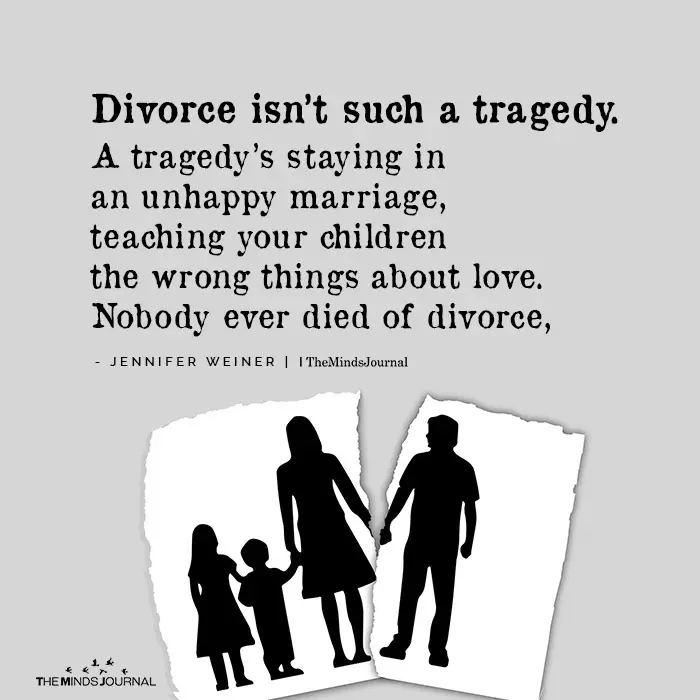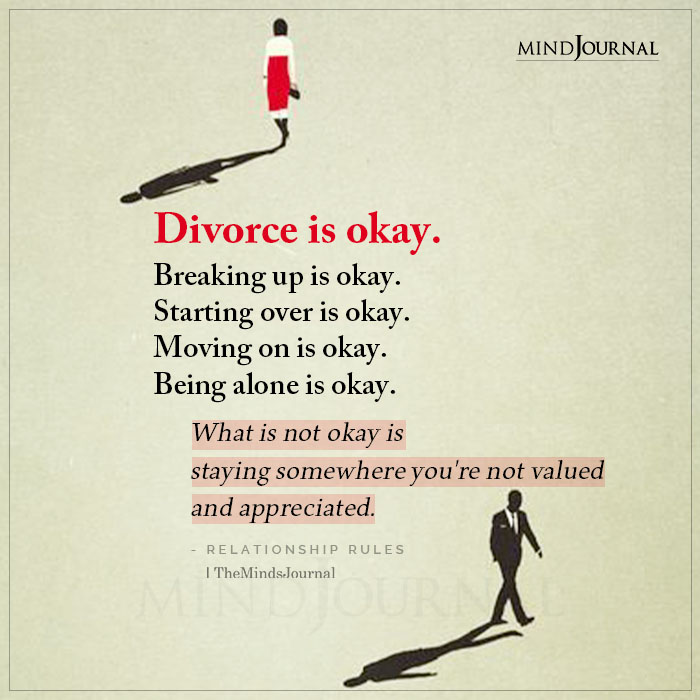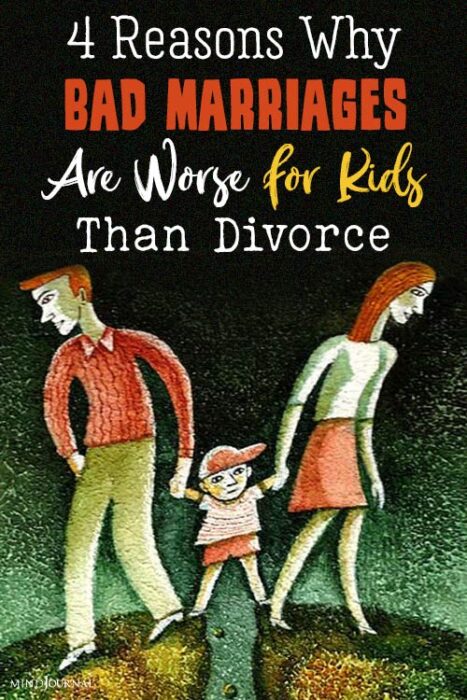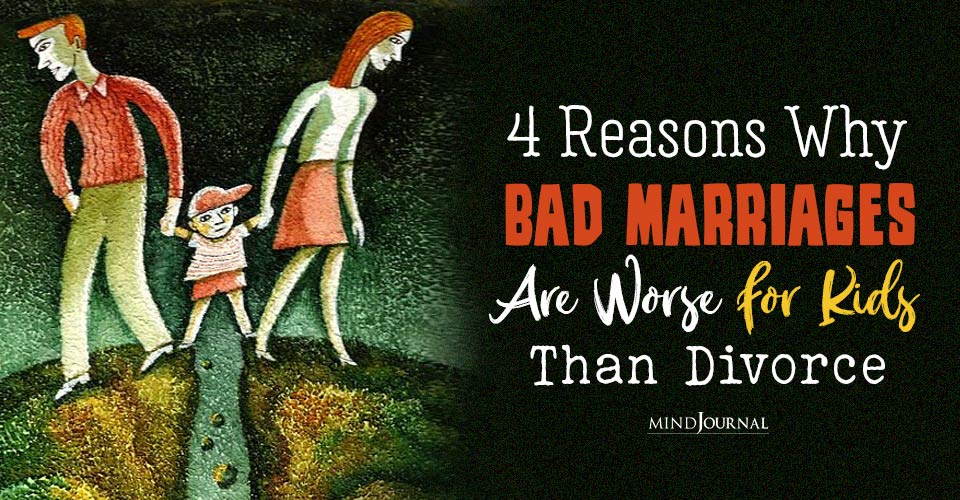Staying in a bad marriage for your kids is not the noble decision you believe it to be. Witnessing an unhealthy relationship between you and your spouse and seeing your toxic marriage up close can cause even more damage than divorce in the long run.
Attitudes toward divorce are changing. When I was a kid, divorced parents were given the evil eye. Heads shook, tongues clicked; divorcees were homewreckers, selfish and unloving, they destroyed children’s lives. Some churches banned them from services—apparently, even God wasn’t a fan.
The message to married couples: Keep your marriage intact by any means necessary.
Times have changed; today, nearly half of all marriages in the U.S. end in divorce. Whether divorce hurts or helps children depends on how it is handled by their parents, but one thing is certain: Staying in a toxic marriage is certain to cause children more damage than good.
Kids forced to endure loveless marriages and tolerate emotional tension day after day bear the full brunt of their parents’ dysfunctional relationship. They intuitively feel their parents’ unhappiness and sense their coldness and lack of intimacy.
In many cases, children blame themselves, feeling their parents’ combative relationship is somehow their fault. In such cases, staying together “for the kids” is a cruel joke.
Related: Divorce Advice: How To Leave A Broken Home Before You Become Broken
4 Ways Kids Suffer Through A Gloomy And Despondent Marriage
1. Chronic Tension
Our parents’ relationship leaves an emotional imprint on us that never fades. A natural part of children’s development is internalizing both their parents. When parents are consistently at odds, their kids internalize those conflicts.
Rather than feeling soothed or comforted when they are with both parents, they feel tense. Such ongoing tension can produce serious emotional, social, and physical ailments in children, such as depression, hopelessness, or chronic fatigue.

2. An Unstable Sense of Self
James Dean cried out to his bickering parents in Rebel Without a Cause, “Stop it! You’re tearing me apart!” because the war between parents does take root inside children’s minds.
The strain eats away at their security and leaves them with little internal peace, putting them at odds with their own impulses.
For example, they long to be loved, but reject closeness; they yearn for friends but choose isolation; they will have great intellectual or creative abilities, yet sabotage their own efforts.
The external conflict between their parents eventually becomes an internal battle with themselves that complicates their life and hinders their emotional development.
3. Fear of Intimacy
Children raised by battling parents have great difficulty getting close to others. Intimacy triggers the traumas they suffered when witnessing their parents’ dysfunction, so they avoid closeness to steer clear of getting hurt.
If they manage to establish an intimate relationship, they remain cautious or guarded. When conflict arises, they’re most likely to flee or to reenact their parents’ conflicts with their own partner.
Related: 7 Reasons People Stay In A Marriage That Doesn’t Work
4. Mood Problems
Warring parents produce children who struggle with serious mood problems, such as dysthymia. These problems, if left untreated, may fuel personality disorders or substance abuse.
At the root of these problems is a profound lack of hope. They learn at an early age to abandon optimism and expect the worst. Sadly, bad marriages cause kids to mature too quickly and lose out on their childhood.
Before You Consider Divorce
Ending a marriage is a brutal undertaking that should only be an option after all other efforts have been exhausted.
Before you call your lawyer, here are a few suggestions:
Couples Counseling
Couples counseling works best when it teaches parents how to work through their conflicts without resorting to emotional warfare (see “Hate Me in a More Loving Way: A Couples Guide to Better Arguing”).
It also gives ill-tempered parents a place to work through their differences rather than exposing their kids to them. The goal of couple’s therapy is to enrich communication and enhance intimacy.
But be warned: Couples therapy can be treacherous, and the wrong therapist can spell doom for your marriage. Gather trustworthy recommendations, take your time, and interview several professionals.
Make sure you both agree on the therapist you choose; otherwise, the therapy will become just another bone of contention.
Individual Therapy
Nothing stirs up unresolved childhood issues like marriage. Too often, couples have unrealistic expectations of marriage and become disillusioned when they discover that good marriages take work.
Before you blame all the problems in your marriage on your partner, get some help for yourself. A skilled therapist can help you identify problems from your past that are resurfacing in your relationship.
Support Groups
The best outcome of group work comes from sharing your feelings and discovering that you’re not alone.
Hearing about other couples’ struggles, the difficulties they face, and how they work through them can bring much-needed inspiration and relief. It also provides you with a community of people who can inspire you with new choices in your marriage.

Zoe’s Story
Zoe, a shaggy-haired thirteen-year-old with sad eyes, glares at me, arms folded and jaw set; a therapy hostage if I ever saw one.
Parents exert their executive power when it comes to therapy, so I don’t expect Zoe to cooperate, especially during our first tumultuous session. To kids like Zoe, therapy is an insult.
Zoe, however, offers me a deal: “I’ll be in therapy with you only if you promise one thing. I want you to convince my parents to get divorced.” I was flabbergasted by her request, but it opened my eyes to something I had never considered—the positive side of divorce.
Zoe suffered ongoing humiliation in public, in school, and in front of her friends due to her parents’ combative relationship. The verbal abuse she witnessed her mother suffer at the hands of her father never let up.
As a result, Zoe struggled with ongoing headaches, depression, and weight problems.
After meeting with her parents and witnessing their sneering contempt for each other, I understood Zoe’s request. If I could barely stand them for 30 minutes, what must it be like to live with them?
Within a year after her parent’s divorce, Zoe’s depression lifted: She went from failing school to placing on the honor roll. She also had her first boyfriend and became socially outgoing. In fact, I was amazed at how much better life became for everyone. (See “Happy Parents, Happy Kids”)
Want to know more about why staying in a bad marriage for the kids sake is a bad idea? Check this video out below!
Written By Sean Grover, LCSW Originally Appeared On Sean Grover









Leave a Reply
You must be logged in to post a comment.